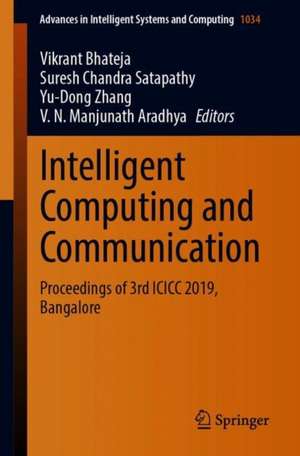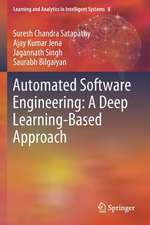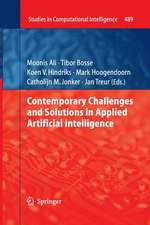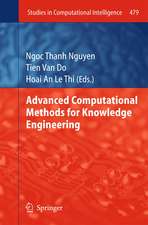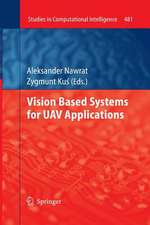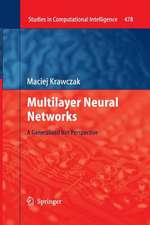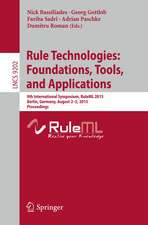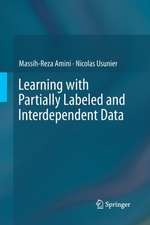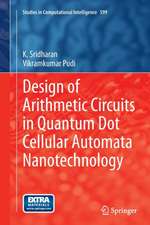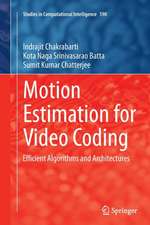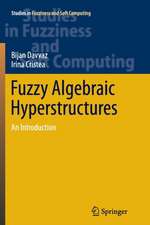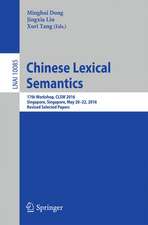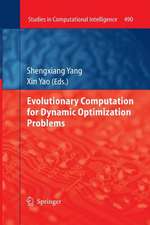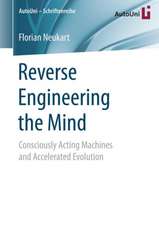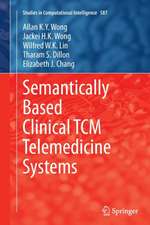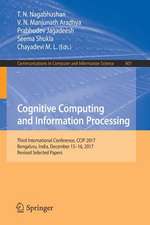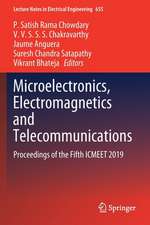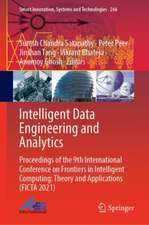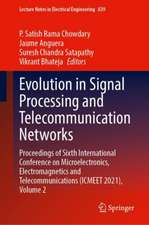Intelligent Computing and Communication: Proceedings of 3rd ICICC 2019, Bangalore: Advances in Intelligent Systems and Computing, cartea 1034
Editat de Vikrant Bhateja, Suresh Chandra Satapathy, Yu-Dong Zhang, V. N. Manjunath Aradhyaen Limba Engleză Paperback – 18 feb 2020
Din seria Advances in Intelligent Systems and Computing
- 20%
 Preț: 1120.90 lei
Preț: 1120.90 lei - 20%
 Preț: 1090.59 lei
Preț: 1090.59 lei - 20%
 Preț: 1324.07 lei
Preț: 1324.07 lei - 20%
 Preț: 1989.79 lei
Preț: 1989.79 lei - 20%
 Preț: 1946.92 lei
Preț: 1946.92 lei - 18%
 Preț: 1273.28 lei
Preț: 1273.28 lei - 20%
 Preț: 2264.51 lei
Preț: 2264.51 lei - 20%
 Preț: 1337.27 lei
Preț: 1337.27 lei - 20%
 Preț: 1297.67 lei
Preț: 1297.67 lei - 20%
 Preț: 1315.82 lei
Preț: 1315.82 lei - 20%
 Preț: 1310.88 lei
Preț: 1310.88 lei - 20%
 Preț: 1302.62 lei
Preț: 1302.62 lei - 20%
 Preț: 882.20 lei
Preț: 882.20 lei - 20%
 Preț: 1305.93 lei
Preț: 1305.93 lei - 20%
 Preț: 1629.32 lei
Preț: 1629.32 lei - 20%
 Preț: 1345.49 lei
Preț: 1345.49 lei - 18%
 Preț: 1227.52 lei
Preț: 1227.52 lei - 18%
 Preț: 1290.64 lei
Preț: 1290.64 lei - 20%
 Preț: 1041.10 lei
Preț: 1041.10 lei - 20%
 Preț: 1034.52 lei
Preț: 1034.52 lei - 20%
 Preț: 1298.50 lei
Preț: 1298.50 lei - 20%
 Preț: 1330.67 lei
Preț: 1330.67 lei - 20%
 Preț: 1483.28 lei
Preț: 1483.28 lei - 20%
 Preț: 1971.64 lei
Preț: 1971.64 lei - 20%
 Preț: 1006.48 lei
Preț: 1006.48 lei - 20%
 Preț: 1471.75 lei
Preț: 1471.75 lei - 20%
 Preț: 1471.56 lei
Preț: 1471.56 lei - 20%
 Preț: 1454.40 lei
Preț: 1454.40 lei - 20%
 Preț: 1494.84 lei
Preț: 1494.84 lei - 20%
 Preț: 1269.64 lei
Preț: 1269.64 lei - 20%
 Preț: 1481.64 lei
Preț: 1481.64 lei - 20%
 Preț: 1192.08 lei
Preț: 1192.08 lei - 20%
 Preț: 1298.50 lei
Preț: 1298.50 lei - 20%
 Preț: 1489.07 lei
Preț: 1489.07 lei - 20%
 Preț: 825.78 lei
Preț: 825.78 lei - 20%
 Preț: 1649.93 lei
Preț: 1649.93 lei - 20%
 Preț: 1463.49 lei
Preț: 1463.49 lei - 20%
 Preț: 1438.77 lei
Preț: 1438.77 lei - 20%
 Preț: 1474.22 lei
Preț: 1474.22 lei - 20%
 Preț: 1298.50 lei
Preț: 1298.50 lei - 20%
 Preț: 1327.35 lei
Preț: 1327.35 lei - 20%
 Preț: 1973.31 lei
Preț: 1973.31 lei - 18%
 Preț: 947.04 lei
Preț: 947.04 lei - 18%
 Preț: 1441.39 lei
Preț: 1441.39 lei - 20%
 Preț: 638.55 lei
Preț: 638.55 lei - 20%
 Preț: 1320.76 lei
Preț: 1320.76 lei - 20%
 Preț: 1948.56 lei
Preț: 1948.56 lei
Preț: 1471.24 lei
Preț vechi: 1839.04 lei
-20% Nou
Puncte Express: 2207
Preț estimativ în valută:
281.56€ • 292.86$ • 232.44£
281.56€ • 292.86$ • 232.44£
Carte tipărită la comandă
Livrare economică 14-28 aprilie
Preluare comenzi: 021 569.72.76
Specificații
ISBN-13: 9789811510830
ISBN-10: 9811510830
Ilustrații: XXII, 860 p. 451 illus., 273 illus. in color.
Dimensiuni: 155 x 235 mm
Greutate: 1.21 kg
Ediția:1st ed. 2020
Editura: Springer Nature Singapore
Colecția Springer
Seria Advances in Intelligent Systems and Computing
Locul publicării:Singapore, Singapore
ISBN-10: 9811510830
Ilustrații: XXII, 860 p. 451 illus., 273 illus. in color.
Dimensiuni: 155 x 235 mm
Greutate: 1.21 kg
Ediția:1st ed. 2020
Editura: Springer Nature Singapore
Colecția Springer
Seria Advances in Intelligent Systems and Computing
Locul publicării:Singapore, Singapore
Cuprins
Task Scheduling in Heterogeneous Cloud Environment- A Survey.- Improving the Efficiency of Ensemble Classifier Adaptive Random Forest with Meta Level Learning for Real Time Data Streams.- Plain Text Encryption using Sudoku Cipher.- Performance Comparison between Different Dispersion Compensation methods in an Optical Link.- First Steps in The Automatic Classification of Legal Sentences.- The Dissociation between Polarity and Emotional Tone as an Early Indicator of Cognitive Impairment: Second Round.- Congestion Control in Optical Burst Switched Networks Using Differential Evolution Optimization.- Locality Parameters For Privacy Preserving Protocol And Detection Of Malicious Third-Party Auditors In Cloud Computing.- Analysis of NaCl electrolyte based SOI-ISFET pH Sensor.- Quantitative Modeling and Simulation for Stator Inter-turn Fault Detection in Industrial Machine.- CMOS Based XOR Gate Design for Full Swing Output Voltage and Minimum Power Delay Product (PDP).- Potential Threat Detection from Industrial Accident Reports Using Text Mining.- Bagging for Improving Accuracy of Diabetes Classification.- Two way Handshake User Authentication Scheme for E-Banking System.- Periocular Biometrics for non-ideal images using Deep Convolutional Neural Networks.- An Elliptic Curve Cryptography based Multi-Server Authentication Scheme using Cancelable Biometrics.- Dynamic TDMA Scheduling for Topology Controlled Clustering in Wireless Sensor Networks.- Deep Learning-Based Music Chord Family Identification.- A Multilevel CNN Architecture for Character Recognition from Palm Leaf Images.- Novel Multimodel Approach For Marathi Speech Emotion Detection.- Assessment of Autistic Disorder Using Machine Learning Approach.- Use of Data Mining Techniques for Data Balancing and Fraud Detection in Automobile Insurance Claims.- Application of Generalized Possibilistic Fuzzy C-Means Clustering for User-profiling in Mobile Networks.- A Method to Detect Blink from the EEG Signal.- Power Efficient Reversible Logic Design of S-Box for N-Bit AES.- Salient edge(s) and region(s) extraction for RGB-D image.- Web Text Categorization: A LSTM-RNN Approach.- Closed-set Device-independent Speaker identification using CNN.- A Novel and Efficient Spatiotemporal Oxygen Production Estimation Based on Land Vegetation using PNN and Convolutional Autoencoder.- A Faster Fuzzy Clustering Approach For Recommender Systems.- Saliency Detection for Semantic Segmentation of Videos.- Real World Anomaly Detection using Deep Learning.- Automatic Facial Expression Recognition using Histogram oriented Gradients (HoG) of Shape Information Matrix.- Quality Enhancement of The Compressed Image Using Super Resolution.- Power Allocation mechanism in Uplink NOMA using Evolutionary Game Theory.- Performance Analysis of Convolutional Neural Networks for Exudate Detection in Fundus Images.- The role of parallelism for Rust Defect Recognition using digital image processing.- An Enhanced Bit-Map-Assisted Energy-Efficient MAC Protocol for Wireless Sensor Networks.- Intuitionistic Fuzzy Logic Controller over the Irrigation Field to Optimized Water Utilization.- Energy Efficient Hybrid Firefly-Crow Optimization Algorithm for VM Consolidation.- Keyless, Robust and Cost-Effective Privacy Protection Algorithm for Videos Using Steganography.- Detection of Epileptic Seizures in EEG - Inspired by Machine Learning Techniques.- Automated Video Surveillance System Using Video Analytics.- On Decision Making Supporting the Shift from Fossil to Renewable Energy Sources within the Norwegian Maritime Transport Sector.- Context Aware Personalized Mobile Learning.- An Evolutionary Algorithmic Framework to Solve Multi-Objective Optimization Problems with Variable Length Chromosome Population.- Irrigation System Automation using Finite State Machine Model and Machine Learning Techniques.- EVaClassifier using Linear SVM Machine Learning Algorithm.- MFCC - based Bangla vowel phoneme recognition from micro clips.- Supporting QoE-aware Live Streaming over Peer to Peer Network.- Action Recognition Using 3D CNN and LSTM for Video Analytics.- A Large Scale Implementation Using MapReduce Based SVM for Tweets Sentiment Analysis.- Chatbot: Integration of Applications within Slack Channel.- A cost-effective sampling strategy for monitoring soil pH value in small scale smart farming.- Hybrid Music Recommendation System based on Temporal Effects.- Differential-Huffman Coding Approach for Lossless Compression of Medical Images.- Detecting Toxicity with Bidirectional Gated Recurrent Unit Networks.- A Design of 12 Bit Low Power Pipelined ADC Using TIQ Technique.- Multi Scale Template Matching To Denoise Epigraphical Estampages.- Security Issues Due to Vulnerabilities in The Virtual Machine of Cloud Computing.- A TFD Approach to Stock Price Prediction.- Recognizing and Refinement of Contorted Fingerprint Based on Various Unique Fingerprint Images.- Assessment of Groundwater potential using neural network: A casestudy.- Data Leakage Prevention and Detection Techniques Using Internet Protocol Address.- Recognition of Handwritten Kannada Characters Using Unsupervised Learning Method.- Despeckling of Synthetic Aperture Radar (SAR) Images using Local Statistics based Adaptive Filtering.- A Wind Energy Supported DSTATCOM For Real And Reactive Power Support For A Linear Three Phase Industrial Load.- Solving Combined Economic and Emission Dispatch Problem Using Hybrid RGA-De Algorithm.- Performance Analysis of ST-type Module for Nearest Level Control Scheme based Asymmetric 17-level Multilevel Inverter Fed Single Phase Induction Motor.- Performance Analysis Of Classification Algorithm In Machine Learning Over Air Pollution Data Base.- Face Recognition With Voice Assistance For The Visually Challenged.- An Biometric Based Embedded System For E-Verification Of Vehicle Users For Rto.- Comparative Analysis of Apache Spark and Hadoop Map Reduce using various parameters and execution time.- A Fuzzy Approach to Spatio-Temporal Analysis for Pedestrian Surveillance.- Human Action Recoginition in Unconstrained Videos using Deep Learning Techniques.- A Multi-resolution Face Verification System for Crowd Images across Varying Illuminations.- A New Approach for Matrix Completion using Arrow Relation of FCA in Recommender Systems.- Data Mining Techniques for Videos Subscribers of Google YouTube.- Prevalence of HCV in Shopian: Using Data Visualization (Data Mining).- Similarity Analysis of Residual Frames for Inter Frame Forgery Detection in Video.- DNA Sequence Alignment using Dynamic Programming.- Facial Landmark Localization Using an Ensemble of Regression Trees on PC Game Controlling.- Continuous Gait Authenticationagainst Unauthorized Smartphone Access through Naıve Bayes Classifier.
Notă biografică
Vikrant Bhateja is Associate Professor, Department of Electronics & Communication Engineering, Shri Ramswaroop Memorial Group of Professional Colleges (SRMGPC), Lucknow and also the Head (Academics & Quality Control) in the same college. He is doctorate in Bio-Medical Imaging & Signal Processing and has a total academic teaching experience of 16 years with around 125 publications in reputed international conferences, journals and online book chapter contributions. His areas of research include digital image and video processing, computer vision, medical imaging, machine learning, pattern analysis and recognition. Dr. Vikrant has edited 15 proceeding books/editorial volumes with Springer Nature. He is Editor-in-Chief of IGI Global--International Journal of Natural Computing and Research (IJNCR). He is also associate editor in International Journal of Synthetic Emotions (IJSE) and International Journal of Ambient Computing and Intelligence (IJACI) under IGI Global press. He is guest editor Special Issues in reputed Scopus/SCIE indexed journals under Springer-Nature: “Evolutionary Intelligence” and “Arabian Journal of Science and Engineering”.Suresh Chandra Satapathy is a Ph. D in Computer Science, currently working as Professor and at KIIT (Deemed to be University), Bhubaneshwar, Odisha, India. He held the position of the National Chairman Div-V (Educational and Research) of Computer Society of India and is also a senior Member of IEEE. He has been instrumental in organizing more than 20 International Conferences in India as Organizing Chair and edited more than 30 Book Volumes from Springer LNCS, AISC, LNEE and SIST Series as Corresponding Editor. He is quite active in research in the areas of Swarm Intelligence, Machine Learning, Data Mining. He has developed a new optimization algorithm known as Social Group Optimization (SGO) published in Springer Journal. He has delivered number of Keynote address and Tutorials in his areas of expertise in various events in India. He has more than 100 publications in reputed journals and conf proceedings. Dr. Suresh is in Editorial board of IGI Global, Inderscience, Growing Science journals and also Guest Editor for Arabian Journal of Science and Engg published by Springer.
Yu-Dong Zhang received his Ph. D. degree from Southeast University, China in 2010. He worked as post-doc from 2010 to 2012 and a research scientist from 2012 to 2013 at Columbia University, USA. He served as Professor from 2013 to 2017 in Nanjing Normal University, where he was the director and founder of Advanced Medical Image Processing Group in NJNU. From 2017, he served as Full Professor in Department of Informatics, University of Leicester, UK. His research interests are deep learning in communication and signal processing, medical image processing. He was included in “Most Cited Chinese researchers (Computer Science)” from 2015 to 2018. He won “Emerald Citation of Excellence 2017”, and“MDPI Top 10 Most Cited Papers 2015”. He was included in Top Scientist list in “Guide2Research”. He is now the editor of Scientific Reports, Journal of Alzheimer‟s Disease, International Journal of Information Management, etc. He is the senior member of IEEE and ACM. He has conducted and joined many successful academic grants and industrial projects, such as NSFC, NIH, EPSRC, etc.
V. N. Manjunath Aradhya is currently working as an Associate Professor in the Dept. of MCA, Sri Jayachamarajendra College of Engineering, Mysuru. He received the M.S. and Ph.D degrees in Computer Science from University of Mysore, Mysuru, India, in 2004 and 2007 respectively. He is a recipient of “Young Indian Research Scientist” from Italian Ministry of Education, University and Research, Italy during 2009-2010. His professional recognition includes as a Technical Editor for Journal of Convergence Information Technology (JCIT), Editor Board in Journal of Intelligent Systems, reviewer for IEEE Trans on System, Man and Cybernetics - PART B, Pattern Recognition (PR), Pattern Recognition Letters (PRL) etc. Also member of program committees of over 45 International Conferences. His research interest includes, Pattern Recognition, Image Processing, Document Image Analysis, Computer Vision, Machine Intelligence, Applications of Linear Algebra for the Solution of Engineering Problems, Biclustering of Gene Expression Data and Web Data Analysis and Understanding. He has published more than 135 research papers in reputed international journals, conference proceedings, and edited books.
Yu-Dong Zhang received his Ph. D. degree from Southeast University, China in 2010. He worked as post-doc from 2010 to 2012 and a research scientist from 2012 to 2013 at Columbia University, USA. He served as Professor from 2013 to 2017 in Nanjing Normal University, where he was the director and founder of Advanced Medical Image Processing Group in NJNU. From 2017, he served as Full Professor in Department of Informatics, University of Leicester, UK. His research interests are deep learning in communication and signal processing, medical image processing. He was included in “Most Cited Chinese researchers (Computer Science)” from 2015 to 2018. He won “Emerald Citation of Excellence 2017”, and“MDPI Top 10 Most Cited Papers 2015”. He was included in Top Scientist list in “Guide2Research”. He is now the editor of Scientific Reports, Journal of Alzheimer‟s Disease, International Journal of Information Management, etc. He is the senior member of IEEE and ACM. He has conducted and joined many successful academic grants and industrial projects, such as NSFC, NIH, EPSRC, etc.
V. N. Manjunath Aradhya is currently working as an Associate Professor in the Dept. of MCA, Sri Jayachamarajendra College of Engineering, Mysuru. He received the M.S. and Ph.D degrees in Computer Science from University of Mysore, Mysuru, India, in 2004 and 2007 respectively. He is a recipient of “Young Indian Research Scientist” from Italian Ministry of Education, University and Research, Italy during 2009-2010. His professional recognition includes as a Technical Editor for Journal of Convergence Information Technology (JCIT), Editor Board in Journal of Intelligent Systems, reviewer for IEEE Trans on System, Man and Cybernetics - PART B, Pattern Recognition (PR), Pattern Recognition Letters (PRL) etc. Also member of program committees of over 45 International Conferences. His research interest includes, Pattern Recognition, Image Processing, Document Image Analysis, Computer Vision, Machine Intelligence, Applications of Linear Algebra for the Solution of Engineering Problems, Biclustering of Gene Expression Data and Web Data Analysis and Understanding. He has published more than 135 research papers in reputed international journals, conference proceedings, and edited books.
Textul de pe ultima copertă
This book features a collection of high-quality, peer-reviewed papers presented at the Third International Conference on Intelligent Computing and Communication (ICICC 2019) held at the School of Engineering, Dayananda Sagar University, Bengaluru, India, on 7 – 8 June 2019. Discussing advanced and multi-disciplinary research regarding the design of smart computing and informatics, it focuses on innovation paradigms in system knowledge, intelligence and sustainability that can be applied to provide practical solutions to a number of problems in society, the environment and industry. Further, the book also addresses the deployment of emerging computational and knowledge transfer approaches, optimizing solutions in various disciplines of science, technology and healthcare.
Caracteristici
Discusses recent research trends in the areas of computational intelligence, communications, data mining, and computational models Presents applications to provide design, analysis, and modeling for key areas in computational intelligence Explains effective computational algorithms and tools for efficient implementation
